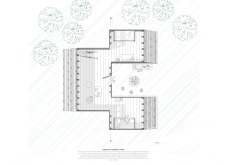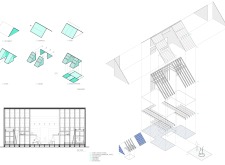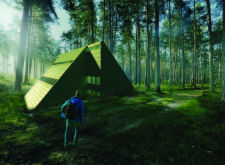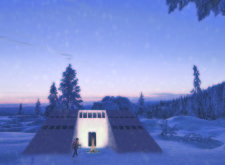5 key facts about this project
### Overview
The Amber Road Trekking Cabins are located along the coastline of Lahemaa National Park in Estonia. The project intends to create a retreat for adventurers seeking a connection with nature, with a design that combines functionality and aesthetics. The cabins are designed to foster both social interaction and solitude, offering spaces that cater to the diverse needs of visitors.
### Spatial Organization
The layout of the cabins effectively distinguishes between public and private areas, facilitating movement and interaction. Communal spaces are centrally positioned and feature large windows and doors that open to outdoor terraces, thus enhancing the living experience by merging interior and exterior environments. In contrast, the individual cabins are strategically placed to ensure privacy and comfort, with bathrooms conveniently located to serve these private areas without compromising personal space. This configuration promotes a sense of community while respecting the autonomy of each visitor.
### Materiality and Sustainability
The design incorporates a selection of sustainable materials that address both aesthetic and ecological considerations. The use of locally sourced wood for the exposed timber frame reduces carbon emissions, while extensive glass apertures provide natural light and views of the surrounding forest. Structural elements of steel ensure durability, complemented by stone flooring that integrates with the landscape. Composite materials used for external cladding enhance sustainability and weather resistance, supporting a commitment to environmentally responsible architecture. The structural features, including sloped roofs designed for rainwater runoff and advanced timber framing methods, further reflect innovative practices aimed at improving thermal performance and minimizing environmental impact.























































